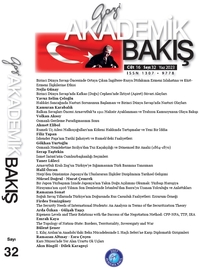Osmanlı Memleketine Sicilya’dan Tuz Kaçakçılığı ve Dönemsel Bir Analiz (1864-1870)
Salt Smuggling from Sicily to the Ottoman State and a Periodic Analysis (1864-1870)
Author(s): Serap TaştekinSubject(s): 19th Century, The Ottoman Empire
Published by: Gazi Akademik Bakış
Keywords: Salt Smuggling; Sicillia; Italia; Rustem Pasha; Salt Monopoly;
Summary/Abstract: Salt, which had an important place in the economic and financial life of the Ottoman State, was a mine both used in the domestic market and exported. After the Salt Regulation was enacted in 1862, the circulation of salt in the domestic market and the control of its export were conducted by the state. Those who did not want to comply with the monopoly and import ban imposed after the enactment of the regulation brought salt to the Ottoman ports by the routes they used before. However, although salt was available in adequate quantities in the domestic market, salt smuggled from abroad was preferred because it was often cheaper. Sicily, which had diplomatic and commercial relations with the Ottoman State, was one of the centers where salt was imported. While Sicilian sailors attempted to smuggle salt to Ottoman ports, Rustem Pasha, the ambassador in Florence, developed his own methods to prevent salt smuggling. Rustem Pasha asked the consulates to report the information of the ships that smuggled salt and sent the intelligence he had obtained to the Customs House. Rustem Pasha reported all the ships loaded with smuggled salt that set out from Sicily to the Ottoman ports with the information he received from the consulates and warned the Sublime Porte to take precautions against these ships at the customs. Studies on salt trade and smuggling in the Ottoman State focused on Duyun-ı Umumiye (Public Debts) in terms of period, and on Cyprus and the Black Sea regionally, but Sicily, which had world-famous salt, was not included. Therefore, all correspondence in French that Rustem Pasha sent to Customs House and Foreign Affairs Office in order to take precautions against the ships carrying salt from Sicily to the Ottoman ports is of great importance. The documents in the study include the smuggling events after 1862, when the Salt Monopoly began to be implemented. The documents contain information about the departure and destination ports of ships smuggling from Sicily, their capacities, and the amount of salt they carried. A table created from the French translations of Rustem Pasha’s correspondence in the Ottoman Archives Foreign Office catalogue will be given at the end of the study.
Journal: Gazi Akademik Bakış
- Issue Year: 16/2023
- Issue No: 32
- Page Range: 151-172
- Page Count: 22
- Language: Turkish

